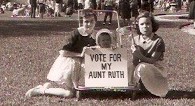Ruth Cupp
Ruth Cupp (née Williams; December 16, 1928 – July 9, 2016) was an American lawyer, legislator, judge, and author in South Carolina.
[1] Williams attended Winthrop College in Rock Hill, South Carolina, where she earned a scholarship and majored in sociology and political science.
She wrote that from 1895 to the 1950s all South Carolina lawyers and certain officeholders, "had to swear, upon their admission to the bar, not to settle disputes by dueling.
[8] The South Carolina Code at the time also provided that "a child under the age of ten or a totally blind person is qualified to draw the jury, whose names of individuals are encased in a capsule and placed in a drum".
The only South Carolina jury girl child that I have been able to identify is Pamela Hughes, now a school principal in Berkeley County.
[10] She practiced law with the president of the Charleston Bar, Robert Figg, and then later worked for the office of Hope and Cabaniss.
[1] She was unmarried at the time that she ran for office, and in an apparent attempt to emphasize her focus on family values, a niece of hers was photographed in a baby carriage with the campaign sign "Vote for My Aunt Ruth".
(Allegedly, the major objection was the cost to provide jury lavatories, two for males and two for women, one each for "Coloreds" and "Whites.")
[3] In 1971, after serving in the South Carolina House, Williams was asked by Winthrop College President Charles Davis to "lead a committee of alumni" to work towards making Winthrop a coeducational institution by lobbying for a legislative change to the college's charter.
[16] She stated that her time "serving in the General Assembly gave [her] a good understanding of how the lobbying process works.
[20] She later commented, "I did not know until I arrived that I was the first female to attend [the Charleston County Bar], and I did not know until almost 50 years later that a senior member objected to my presence.
The Bar's highest award is not given annually but at the discretion of the association's standing committee for demonstrating sterling principles as a lawyer.
When I graduated from law school in 1954, my class was the last new group that had to stand before the South Carolina Supreme Court and swear we would not settle any disputes by dueling.
[3][5][20] Miracles on St. Margaret Street discusses the history of the Florence Crittenton Programs of South Carolina; Cupp was involved with this organization, which assisted single expectant women.
